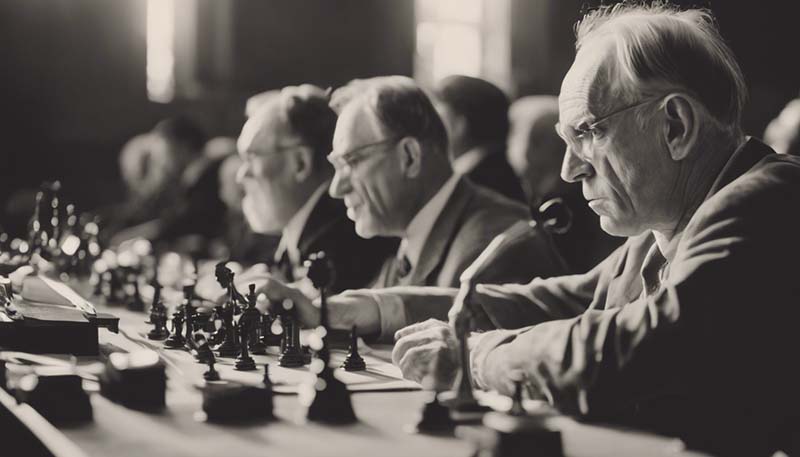The Scopes Trial: The Battle Over Evolution and Creationism
The Scopes Trial: The Battle Over Evolution and Creationism
Introduction
The Scopes Trial, also known as the \"State of Tennessee vs. John Thomas Scopes\" or the \"Monkey Trial,\" was a pivotal moment in the history of the United States. It was a landmark legal case that took place in 1925, which pitted the theory of evolution against creationism. The trial was a result of the passage of the Butler Act, a Tennessee law that prohibited the teaching of human evolution in public schools. The case brought national attention to the debate over science and religion, and it remains a significant event in American history.
Background
The early 20th century was a time of great change in the United States. The country was recovering from the devastation of World War I, and the Roaring Twenties were just beginning. It was a time of rapid industrialization, urbanization, and social change. Many Americans were grappling with the implications of these changes, and some sought solace in traditional values and beliefs.
One of the most contentious issues of the time was the teaching of evolution in public schools. The theory of evolution, first proposed by Charles Darwin in the 19th century, was gaining acceptance among scientists and intellectuals. However, many religious groups opposed the teaching of evolution, arguing that it contradicted the biblical account of creation.
Advertisement
In 1925, Tennessee passed the Butler Act, which made it illegal for public school teachers to teach any theory that denied the divine creation of man. The law was championed by anti-evolutionists, who believed that teaching evolution would undermine religious faith and moral values.
The Trial
The Scopes Trial began on July 10, 1925, in Dayton, Tennessee. John T. Scopes, a young high school science teacher, was charged with violating the Butler Act. He was defended by Clarence Darrow, a prominent lawyer and well-known agnostic. The prosecution was led by William Jennings Bryan, a three-time presidential candidate and a staunch defender of fundamentalist Christianity.
The trial was a media circus, with reporters from around the country descending on the small town of Dayton. The case quickly became a national spectacle, with people on both sides of the debate closely following the proceedings.
The defense argued that the theory of evolution was a well-established scientific fact and that the Butler Act was an infringement on academic freedom. Darrow called a number of expert witnesses, including scientists and scholars, to testify on behalf of Scopes.
The prosecution, on the other hand, argued that the teaching of evolution was a threat to the moral fabric of society. Bryan claimed that the theory of evolution led to moral relativism, atheism, and social decay. He called a number of religious leaders and theologians to testify in support of his argument.
One of the most dramatic moments of the trial came when Darrow called Bryan himself to the stand as an expert witness on the Bible. Darrow questioned Bryan\'s interpretation of the Bible, challenging his literalist view and arguing that the Bible should be understood as a collection of allegorical and metaphorical stories.
The verdict
On July 21, 1925, after a week of testimony and deliberation, the jury found John Scopes guilty of violating the Butler Act. He was fined $100. However, the victory for the anti-evolutionists was short-lived. The Tennessee Supreme Court later overturned the verdict on a technicality, ruling that the fine should have been imposed by the jury, not the judge.
The legacy of the Scopes Trial
The Scopes Trial had a profound impact on American society and culture. It brought the debate over evolution and creationism into the national spotlight and helped to polarize the country along religious and scientific lines.
The trial also had a lasting impact on the legal system. The First Amendment\'s protection of freedom of religion was clarified, and the concept of the \"wall of separation\" between church and state was reinforced.
Furthermore, the Scopes Trial helped to galvanize the scientific community and solidify the acceptance of the theory of evolution among scientists and intellectuals. It also contributed to the rise of the modern creationist movement, which continues to challenge the teaching of evolution in public schools.

In the years following the trial, the debate over evolution and creationism has continued to be a contentious issue in American society. The Scopes Trial remains a significant event in American history, a symbol of the ongoing struggle between science and religion.
Conclusion
The Scopes Trial was a pivotal moment in American history, capturing the nation\'s attention and highlighting the ongoing debate between science and religion. The trial brought to light the tensions between traditional beliefs and modern scientific understanding, and it continues to be a significant event in the history of the United States.
The legacy of the Scopes Trial is still felt today, as the debate over the teaching of evolution in public schools continues to be a contentious issue. The trial serves as a reminder of the importance of academic freedom and the need to balance the competing demands of science and religion in a democratic society.